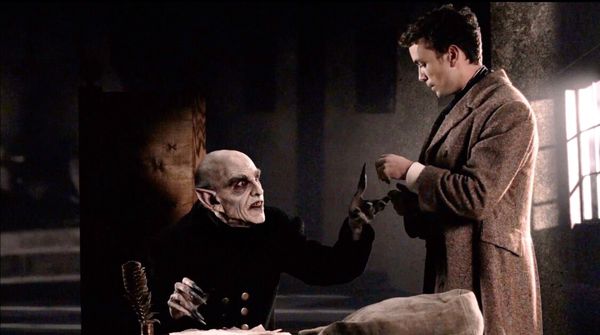Eye For Film >> Movies >> Nosferatu (2023) Film Review
Nosferatu
Reviewed by: Jennie Kermode

It’s a style of filmmaking that director David Lee Fisher refers to as a ‘remix’, and which he has previously exercised in reshaping Robert Wiene’s 1928 classic The Cabinet Of Dr Caligari: taking the original ‘backing track’ of a film – its set photography and storyline – and pasting in different actors, with new, spoken dialogue and occasional changes in the plot. Upon first consideration this is likely to make most film fans wince, but it does have artistic potential. Is it really so very different from restaging a classic play using elements from the original production? As long as everyone is properly credited, there’s no obvious moral objection. Of course, that doesn’t make it watchable.
As a rule, the best cover versions of songs are those that interpret them in ways very different from the originals. Artists’ attempts to cover the classics they love in a similar style are frequently a disappointment because it takes tremendous talent to improve on that sort of thing. For a filmmaker to take on FW Murnau’s legendary Nosferatu requires guts and, it has to be said, a remarkable degree of ego. Werner Herzog got away with it. Fisher, despite keeping many of the original elements in place, struggles.

The main reason that people will be drawn to this film is the presence of Doug Jones, celebrated star of The Shape Of Water, in the title role. It’s a smart piece of casting and it pays off. Jones inhabits the character well, bringing his own brand of darkness and soulfulness to it. In any other context, it’s a performance which would attract serious praise. Sadly, for all his powers, he is no Max Schreck. He needs much heavier make-up and looks more cartoonish as a result, and he cannot capture the same air of uncanny charisma, which the film really depends on; neither can he compel the viewer’s attention as Klaus Kinski did in his attempts. Furthermore, given the limitations of his co-stars, he has a much tougher job.
There is potential in modernising the younger characters in order to engage with a fresh audience, but Fisher’s attempt to blend present day acting styles with those of the silent era makes the whole thing feel like a pantomime, and that isn’t as much fun as it sounds. Emrhys Cooper, best known for his work in Coronation Street and gay vampire TV series The Lair: OnlyFangs, is painfully out of place as hero Thomas Hutter, desperate to save his beloved from the grip of the fiend despite the fact that, elsewhere, he seems to have little interest in her. His scenes with Jones are not too bad, the older actor being able to coax something deeper out of him, but he never manages to gel with his surroundings on any level.
Sarah Carter, as heroine Ellen, does a little better, despite having to work through layers of make-up almost as thick as those on Jones. She’s been subject to that fashionable kind of beautification that endeavours to remove all traces of expression from the face, and only really has her hands, shoulders and eyes to work with in scenes where we need to see her interior strife, torn as she is between her bond with Thomas and the strange allure of the monster. Implying that this attraction predates the latter’s arrival in England, the film gives her more to work with at a character level than other versions. This creates frustration, however, when we keep cutting away to the vapid Thomas or to Eddie Allen’s gurning lunatic Knock. Renfield was always the most interesting character in Dracula and this analogue ought to give an actor real possibilities; it’s quite something to see him overacted to this degree.
Overall, one is left wondering what the point of all this is. It has little to add to the original and detracts from its most successful qualities. An interesting idea has failed to come to fruition. What remains is a reanimated corpse with no vitality of its own.
Reviewed on: 19 Oct 2024















